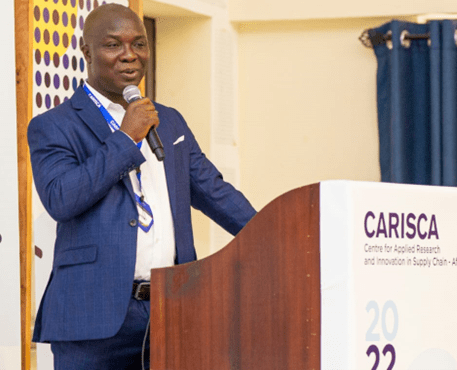The Dean of School of Business – Kwame Nkrumah University of Science and Technology and the Chairman of OR Tambo Africa Research Entrepreneurship and Employability, KNUST, Prof. Nathaniel Boso, has expressed doubts about Africa’s readiness to be globally competitive and prosperous due to lack of sufficient researchers.
According to him, countries that spend more on research and innovation tend to be the most competitive and prosperous globally. In the case of Africa, the proportion of researchers in the African population is 25 and 28 times lower than the proportion in the United Kingdom and the United States, respectively.
The percentage of Africans pursuing graduate research study is three times lower than the global average, with similar gaps with respect to facilities and equipment needed to conduct cutting-edge research on the continent.
African countries lack the infrastructure to support investment in research and innovation activities, and investment is lacking in building up research infrastructure.
It is also the case that resources for research and innovation on the continent are fragmented, with individuals, organisations and governments that fund and engage in research and innovation activities not having any mechanism for systematic collaboration.
He emphasised that research and innovation activities are instrumental in driving societal and economic development; and evidence shows how these activities can transform societies through economic growth, job creation, technological advancements, and solutions for pressing developmental challenges.
However, giving a keynote address at the Research and Innovation Strategy Group (RISG) Dialogue in Durban, South Africa on the topic ‘Research and Innovation for Societal and Economic Impact’, Prof. Boso mentioned that Africa is completely absent from the world’s top 20 innovative countries in terms of research and development expenditures, the number of domestic patent applications and the number of domestic public high-tech companies.
“Africa is completely absent. This raises serious concerns about Africa’s readiness for global competitiveness,” he laments.
Challenges with research and innovation
Dr. Boso, highlighting some challenges associated with research and innovation spending in Africa, observed that Africa’s continued low investment in research and innovation is seriously undermining the continent’s economic transformation goal.
While research institutions, particularly universities, in more innovative economies rely on funding from a variety of public and private sector funding sources such as “crowdfunding, industrial grants, licensing of IPs, philanthropic grants, internal resources, government grants, and others”, research and innovation in Africa is largely funded by the public sector, with significant proportions of financing in many African countries coming from international development agencies and aid providers; but this funding remains dreadfully insufficient.
“For example, universities in Ghana receive less than US$1,000 per annum per academic faculty from government to fund what is called faculty Book and Research Allowance. Researchers in many African HEIs must, therefore, depend largely on very competitive international research grant calls to remain relevant in research,” he stressed.
He cited unstable political environments, poor governance, and corruption as major deterrents to private sector funding for research and innovation on the continent. As a result, there are not enough resources and infrastructure available for research and innovation in Africa, and with the limited resources available, much is not done because they are so fragmented.
Consequences
Due to the low research and innovation investment, Prof. Boso highlighted some major effects it has had on Africa economies.
He indicated that poor economic and scientific infrastructure has compelled the continent to rely on outdated colonial development model of resource extraction, which is unsustainable and largely responsible for the continent’s worsening poverty condition and continued dependency on aid from other countries to fund the continent’s budgets, stating that the continent received a total of US204billion in aid in 2022, representing 47.2 percent of all global aid.
Additionally, Prof. Boso noted that another consequence is high brain-drain of talents to more innovative Organisation for Economic Co-operation and Development (OECD) countries. As Mo Ibrahim Foundation recently highlighted, a growing brain-drain of talents is a bane to Africa’s development potential.
The African Union estimates that about 70,000 skilled professionals, particularly healthcare professionals, leave the continent every year with the total number of African migrants in OECD countries estimated to rise to 34 million by 2050. Interestingly, countries that rank high on global innovation index, such as France, UK and U.S, are host to about 50 percent of the total sub-Saharan African diaspora.
Finally, there has been poor quality and low volume of research from the continent. “According to the World Bank, African researchers produce only 1 percent of the world’s research, and that is disappointing,” he added.










